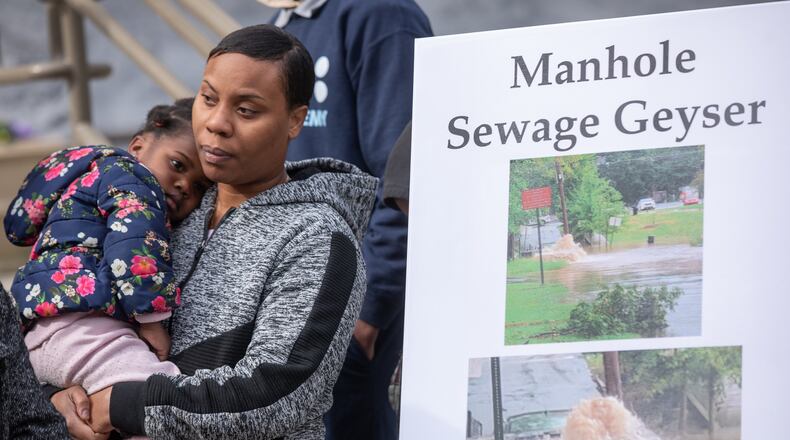The September 14th flash flood last fall ravaged the city and left a trail of devastation throughout Atlanta communities — particularly in Black neighborhoods that are plagued by a centuries-old water and sewer system.
That afternoon, rushing water began spilling into homes while residents frantically scrambled to save their belongings, and in many cases young children and pets from the rising water.
Now, five months later, numerous victims of the severe weather event are suing the city for its response to the flooding and “mismanagement” of the water and sewer system.
Hunter Hills resident Mahdi Chaney described how he slowly lost feeling in his hands as he tried to barricade his back door. His efforts were futile as over five feet of water consumed the lower levels of his home within 30 minutes.
“Moments later, the strong water smashed in my back door,” he remembered on Thursday. “As I ran through the sewage water, I saw the water spilling into the windows.”
If the storm had happened while the family slept, he said, he believes his 2-year-old daughter or elderly mother could have drowned.
Credit: Riley Bunch/riley.bunch@ajc.com
Credit: Riley Bunch/riley.bunch@ajc.com
Mahdi’s story was echoed by a group of Atlantans that live on the west side of the city, who told their own stories of attempting to flee the terrifying flash flood.
On the steps of City Hall, Attorney Meghan Jones announced upwards of 40 Atlanta residents from the neighborhoods of Hunter Hills, Westin Heights, English Avenue and Vine City are suing the city for failing to maintain its stormwater infrastructure.
A problem, she said, that has spanned across numerous mayoral administrations.
“The city has established two Atlanta’s,” Jones said. “An Atlanta that benefits from working sewage systems and another Atlanta whose residents live in fear of sewage water containing fecal matter, bacteria and toxins entering their homes.”
‘I lost everything’
Although the city of Atlanta would not comment on the pending litigation, a spokesperson for the mayor’s office said that after the September flood, the city visited 117 properties and offered property clean-up assistance for eligible residents.
Currently, the city has around $600 million in sewer infrastructure projects underway and more on the docket.
“The City remains committed to completing the necessary sewer infrastructure improvements to abate sanitary sewer overflows, ensure adequate system capacity, reduce flooding and pollution caused by stormwater, and safeguard our citizens’ public health and safety,” the mayor’s office said in a statement.
But many of the residents involved in the lawsuit said Thursday that last fall’s flash flood was not the first time they had sought help from the city when water and sewer spilled into their homes.
Others accused city officials of misleading communities about the level of government support they’d receive in the aftermath, and about whether or not the water that flooded their homes contained sewage.
“All the city had to do was be honest,” said plaintiff Lavonda Moore. “Honest to the fact that they were responsible that they did not unclog the drains for decades — and that they had us exposed to things that damage our health.”
Credit: Riley Bunch/riley.bunch@ajc.com
Credit: Riley Bunch/riley.bunch@ajc.com
For years, the city of Atlanta has been under a federal consent decree over water quality violations. The city’s long-standing “penny” water and sewer tax was established under Former Mayor Shirley Franklin’s administration to help fund both repair and new projects.
Since, the mayor’s office said, the city has invested more than $2 billion in sewer projects.
The city’s water and sewer system dates back to the 19th century and is made up of more than 2,300 miles of lines, according to the Department of Watershed Management.
Atlanta residents are no strangers to issues caused by outdated infrastructure that is a combined system — meaning both stormwater runoff and sewer discharge flow through many of the same pipes. The city said it has been working toward complete separation of the two.
“When large rain events happen, combined sewer and stormwater erupt from the system,” Jones said. “If there’s enough water, the runoff has nowhere to go but into people’s homes.”
But beyond a loss of personal belongings and substantial health threats, Atlantans in the majority-Black communities involved in the lawsuit say the city’s failure to address the consistent flooding issues is robbing residents of the chance to build generational wealth.
Cheryl Stafford, who lives on Joseph E. Boone Boulevard, said the September flood devastated the first apartment she lived in after years of being homeless with her young children.
“My kids were on the streets for two years, so that was my very first apartment with my kids and I lost everything,” she said. “A lot of people lost a lot of things that day.”
Terri Samuels-Gordon, a young resident who also lives on Joseph E. Boone Boulevard, said that her success from her small business led her to be able to move into the apartment — her first as well.
“People want to stay in their homes because they built it — from the ground up,” she said. “You want the memories of the things that you’ve built and it not be completely destroyed.”
In response to the lawsuit, the city said there is a claims process residents can go through to seek financial damages from the flooding and noted that 31 claims have been filed related to the September incident.
But some residents said that their claims have not been processed or that to receive help they were asked to sign paperwork stating that the city isn’t liable for damages.
Credit: Riley Bunch/riley.bunch@ajc.com
Credit: Riley Bunch/riley.bunch@ajc.com
About the Author
Keep Reading
The Latest
Featured






